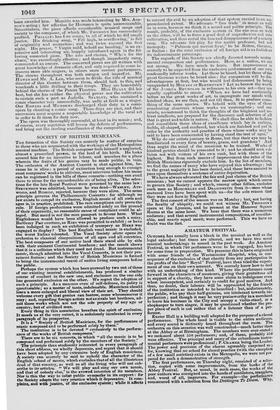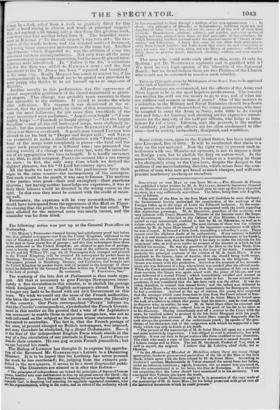AMATEUR FESTIVAL.
OCTOBER has usually been a blank in the musical as well as the legal calendar; but times are altered, and we have two novel musical undertakings to record in the past week. An Amateur Festival, in which 700 performers were to be engaged, has been for some time in preparation. We presume this to have originated with some friends of the Westminster Hospital, who, in con- sequence of the exclusion of that charity from any participation in the profits of the late" Royal" Festival, have thus tried the experi- ment of one on their own account. We scarcely know how to deal with an undertaking of this kind. Where the performers come forward in the characters of amateurs, giving their gratuitous aid in support of a charity, they have some claim to indulgence even when incompetent, and certainly to credit for good motives. And thus, no doubt, their labours will be appreciated by the friends of the institution so intended to be benefited : but, unfortunately, the public, who pay their half-guineas, are intolerant towards on- perfection; and though it may be very praiseworthy in a merchant to leave his business in the City and occupy a violin-stand, or a shopkeeper to turn singer, it may be questioned whether the pro- per place of each is not rather that of a listener than of a per- former.
Exeter Hall is a building well adapted for the purpose of a choral performance. The whole band is visible to the entire audience, and every sound is distinctly heard throughout the room. The orchestra on this occasion was well constructed—much better than at the Abbey or at Birmingham. The numbers were over-stated : we reckoned about 550 performers; and, of these, probably 350 were effective. The principal and many of the subordinate instru- mental performers were professional ; F. CRAMER being the Leader. The power and precision of the chorus agreeably surprised us; for, knowing that no school for choral practice (with the exception of a few small societies) exists in the Metropolis, we were not pre pared for such a demonstration of strength. The first performance, on Thursday night, consisted of a selec- tion, copied with some improvements, from the books of the Abbey Festival. But, as usual, in such cases, the works of the poor authors was consigned into the hands of mutilators, mangler's1 and, worst of all, improvers. For example—the performance commenced with a selection from the Dettingen Te Deum. Why, it may be asked, select from a work so precisely fitted for this bled—a band stroug in chorus and weak in principal singers?
But, not content with taking only a slice from this glorious work,
even that slice had another taken front it. The beautiful move- ment in B minor (" To thee all angels") was torn out : the coa-
flexion of the words broken, and the musical contrast destroyed, bv leaving three successive movements in the same key. Another ipertitteuce which disgusted us, was the addition of some (we presume) amateur accompaniments. Not only were all the noisy insuutnents put in constant requisition, but the most ill-placed inter- polations were introduced. In " Fallen is the foe," a ridiculous solo for the flute was added to HANDEL'S score ; and the first
movement to the Te Deum has been " repaired and beautified" in the same way. Really MOZART has much to answer for, if his accontpailiments to the Messiah are to be quoted as a precedent by every puppy who thinks fit to set himself up as an improver of HANDEL.
Another novelty in this performance was the appearance of several respectable gentlemen of the choral department as princi- pal singers. This change was probably more amusing to them than agreeable to the audience. It served to render the whole affair ridiculous. We suppose it was discovered at the re- hearsal, that the gravest parts, by virtue of this arrangement, be-
came the most ludicrous; for not more than two-thirds of the pieces announced were performed. "Angels ever bright.'—" From
mighty kings"—" Farewell ye limpid springs "—"Let the bright
Seraphim"—and all the old hackneyed songs, were studiously re- tained; but the announced selection from BEETHOVEN'S Mount of Olives was thrown overboard. A gentleman named TURNER was
allowed to try his luck in "Deeper and deeper still ;" and SAPI 0 was permitted to make a similar adventure with "Total eclipse." Some of the songs went completely to pieces—the band and the singer each persevering in a different time ; one presented the striking novelty of a change of time every bar, with the introduc- tion of an appogiatura two bars in length. It is hardly necessary to say that, in such company, PHILLIPS seemed like a sun among the stars : in fact, the only song from which we derived the slightest pleasure, was his "0 Lord have mercy upon me."
All the faults we have noticed in this performance have their origin in the same source—the incompetency of the managers. That such would be the result, it was easy to foresee. The motives of the parties were good—their zeal exemplary—their exertions laborious ; but having neither knowledge nor experience, it was as likely their labours would be directed in the wrong course as the right. In this case they must be content with the credit of mean- ing well.
Fortunately, the expenses will be very inconsiderable, or we should have anticipated from the appearance of the Hall on Thurs- day evening that the profit to the charity would be but small. The space allotted for the reserved seats was nearly vacant, and the remainder was far from filled.



























 Previous page
Previous page